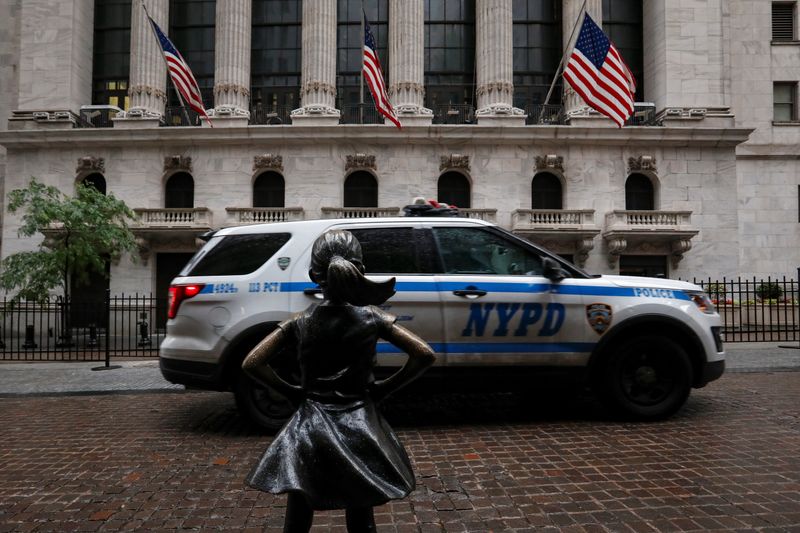By David Randall
(Reuters) - The upcoming U.S. presidential election will likely be an important catalyst for stock market moves in coming months as investors gauge the probabilities of a contested vote and the policies a potential winner would enact.
Democratic nominee Joe Biden is ahead in national polls and in betting markets the former vice president is favored to win with an average 59% likelihood, according to RealClearPolitics.
Here are five issues in Washington that investors say will be important for asset prices.
1) An orderly election
Republican President Donald Trump has questioned the validity of mail-in votes, raising concerns that the results of one or more states will be decided in the courts.
Trump again declined to commit to accepting the results during Tuesday night's first presidential debate, repeating his unfounded complaint that mail-in ballots would lead to election fraud. That has bolstered the case for investor betting on markets staying volatile well after Election Day on Nov. 3.
"People would like to have certainty as soon as possible which way it's going to move forward," said Esty Dwek, head of global market strategy at Natixis Investment Managers.
A report from BNP Paribas (OTC:BNPQY) estimated the chances of a contested election result stand at between 7% and 10%, while assigning only a 1% chance to the possibility of a constitutional crisis that the Supreme Court is unable to avert.
2) Tax rates
Fears of rising tax rates under a Biden administration could hit the large technology stocks that have led the market rally this year if investors seek to book gains before the increase takes place, said Eddie Perkin, chief equity investment officer at Eaton Vance (NYSE:EV).
At the same time, companies could look to issue special onetime dividends to return cash to shareholders before income taxes rise.
"In a normal year you see tax-loss harvesting. This might be a year of tax-gain harvesting," Perkin said.
Hedge fund manager J. Daniel Plants, who runs Voce Capital Management, expressed concern that higher tax rates would squash economic growth and eat into companies' after-tax net income, making "an already expensive market appear even pricier."
"This is simply not the time to engage in such experiments with the economy reeling and the outlook so uncertain," he said.
Analysts at Goldman Sachs (NYSE:GS) take a more sanguine view, forecasting that Biden’s plan would likely shave just 4% from the S&P 500's expected earnings by 2024.
3) U.S.-China tensions
A second Trump term would likely see the president continue confronting China through higher tariffs and restrictions on trade and investment, analysts at Moody's (NYSE:MCO) Analytics wrote.
They assign a 40% probability to Biden gaining the presidency with a Republican Senate and Democratic House, compared with a 35% chance of Trump getting re-elected with the same combination.
Some investors believe Biden's policies toward China are unlikely to substantially differ from Trump's.
"There's a perception that Biden would be better on China, but he could just be different. You wouldn't have the tweets (from Trump), but you would have a Western coalition trying to manage the rise of China," said Dwek.
4) Coronavirus response
U.S. deaths linked to the coronavirus are now above 206,000, by far the highest number of any country, according to a Reuters tally.
Trump has said that a vaccine against the virus would be ready in record time, perhaps before the election, raising questions about whether political pressure might result in the deployment of a vaccine before it is safe.
Analysts at Societe Generale (OTC:SCGLY) put the chances of a coronavirus treatment or vaccine coming sometime in the next three months at around 15%, while reducing the probability of renewed lockdowns to 20% from 30%.
5) Additional fiscal stimulus
The recent death of Supreme Court Justice Ruth Bader Ginsburg has dimmed hopes of Congress passing an economic stimulus bill before the November election, another factor that has weighed on stocks during a volatile September.

Moody's Analytics believes the economy would return to full employment in the second half of 2022 under Biden compared to the first half of 2024 during a second Trump term, largely because of the challenger's more expansive fiscal policies.